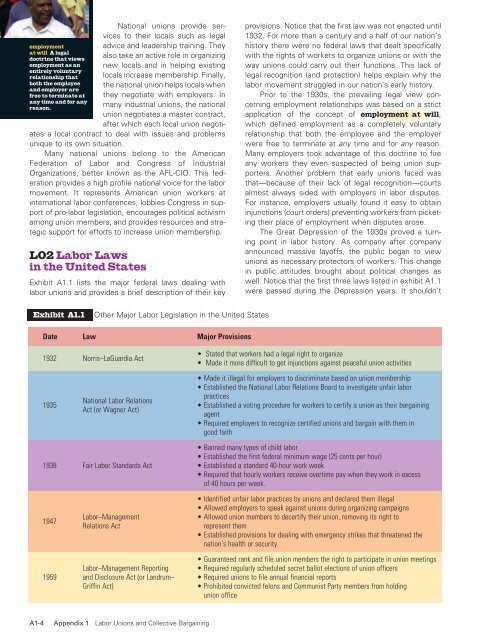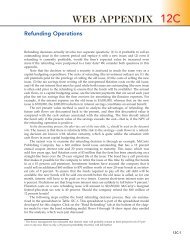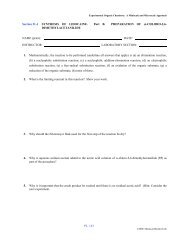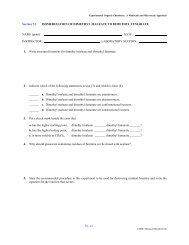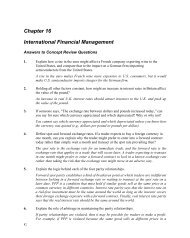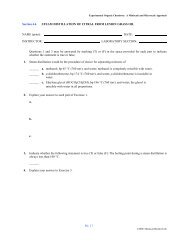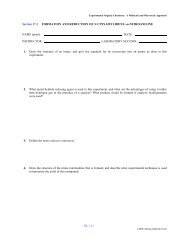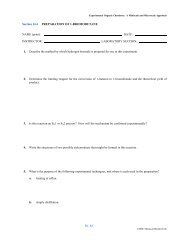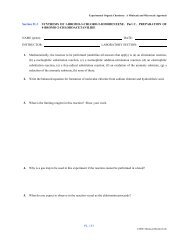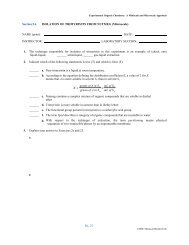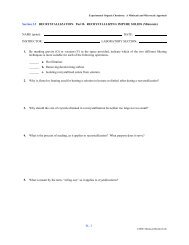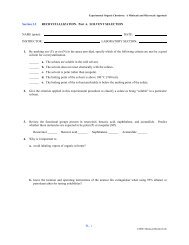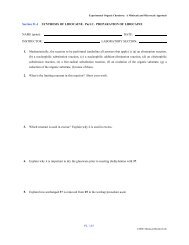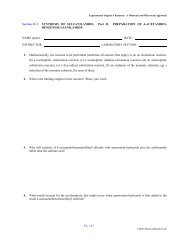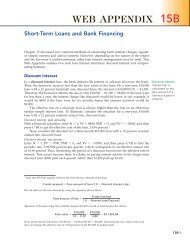Appendix 1: Labor Unions and Collective Bargaining
Appendix 1: Labor Unions and Collective Bargaining
Appendix 1: Labor Unions and Collective Bargaining
You also want an ePaper? Increase the reach of your titles
YUMPU automatically turns print PDFs into web optimized ePapers that Google loves.
employment<br />
at will A legal<br />
doctrine that views<br />
employment as an<br />
entirely voluntary<br />
relationship that<br />
both the employee<br />
<strong>and</strong> employer are<br />
free to terminate at<br />
any time <strong>and</strong> for any<br />
reason.<br />
National unions provide services<br />
to their locals such as legal<br />
advice <strong>and</strong> leadership training. They<br />
also take an active role in organizing<br />
new locals <strong>and</strong> in helping existing<br />
locals increase membership. Finally,<br />
the national union helps locals when<br />
they negotiate with employers. In<br />
many industrial unions, the national<br />
union negotiates a master contract,<br />
after which each local union negotiates<br />
a local contract to deal with issues <strong>and</strong> problems<br />
unique to its own situation.<br />
Many national unions belong to the American<br />
Federation of <strong>Labor</strong> <strong>and</strong> Congress of Industrial<br />
Organizations, better known as the AFL-CIO. This federation<br />
provides a high profile national voice for the labor<br />
movement. It represents American union workers at<br />
international labor conferences, lobbies Congress in support<br />
of pro-labor legislation, encourages political activism<br />
among union members, <strong>and</strong> provides resources <strong>and</strong> strategic<br />
support for efforts to increase union membership.<br />
LO2 <strong>Labor</strong> Laws<br />
in the United States<br />
Exhibit A1.1 lists the major federal laws dealing with<br />
labor unions <strong>and</strong> provides a brief description of their key<br />
provisions. Notice that the first law was not enacted until<br />
1932. For more than a century <strong>and</strong> a half of our nation’s<br />
history there were no federal laws that dealt specifically<br />
with the rights of workers to organize unions or with the<br />
way unions could carry out their functions. This lack of<br />
legal recognition (<strong>and</strong> protection) helps explain why the<br />
labor movement struggled in our nation’s early history.<br />
Prior to the 1930s, the prevailing legal view concerning<br />
employment relationships was based on a strict<br />
application of the concept of employment at will,<br />
which defined employment as a completely voluntary<br />
relationship that both the employee <strong>and</strong> the employer<br />
were free to terminate at any time <strong>and</strong> for any reason.<br />
Many employers took advantage of this doctrine to fire<br />
any workers they even suspected of being union supporters.<br />
Another problem that early unions faced was<br />
that—because of their lack of legal recognition—courts<br />
almost always sided with employers in labor disputes.<br />
For instance, employers usually found it easy to obtain<br />
injunctions (court orders) preventing workers from picketing<br />
their place of employment when disputes arose.<br />
The Great Depression of the 1930s proved a turning<br />
point in labor history. As company after company<br />
announced massive layoffs, the public began to view<br />
unions as necessary protectors of workers. This change<br />
in public attitudes brought about political changes as<br />
well. Notice that the first three laws listed in exhibit A1.1<br />
were passed during the Depression years. It shouldn’t<br />
Exhibit A1.1<br />
Other Major <strong>Labor</strong> Legislation in the United States<br />
Date Law Major Provisions<br />
1932 Norris–LaGuardia Act<br />
• Stated that workers had a legal right to organize<br />
• Made it more difficult to get injunctions against peaceful union activities<br />
1935<br />
National <strong>Labor</strong> Relations<br />
Act (or Wagner Act)<br />
• Made it illegal for employers to discriminate based on union membership<br />
• Established the National <strong>Labor</strong> Relations Board to investigate unfair labor<br />
practices<br />
• Established a voting procedure for workers to certify a union as their bargaining<br />
agent<br />
• Required employers to recognize certified unions <strong>and</strong> bargain with them in<br />
good faith<br />
1938 Fair <strong>Labor</strong> St<strong>and</strong>ards Act<br />
• Banned many types of child labor<br />
• Established the first federal minimum wage (25 cents per hour)<br />
• Established a st<strong>and</strong>ard 40-hour work week<br />
• Required that hourly workers receive overtime pay when they work in excess<br />
of 40 hours per week.<br />
1947<br />
1959<br />
<strong>Labor</strong>–Management<br />
Relations Act<br />
<strong>Labor</strong>–Management Reporting<br />
<strong>and</strong> Disclosure Act (or L<strong>and</strong>rum–<br />
Griffin Act)<br />
• Identified unfair labor practices by unions <strong>and</strong> declared them illegal<br />
• Allowed employers to speak against unions during organizing campaigns<br />
• Allowed union members to decertify their union, removing its right to<br />
represent them<br />
• Established provisions for dealing with emergency strikes that threatened the<br />
nation’s health or security<br />
• Guaranteed rank <strong>and</strong> file union members the right to participate in union meetings<br />
• Required regularly scheduled secret ballot elections of union officers<br />
• Required unions to file annual financial reports<br />
• Prohibited convicted felons <strong>and</strong> Communist Party members from holding<br />
union office<br />
A1-4 <strong>Appendix</strong> 1 <strong>Labor</strong> <strong>Unions</strong> <strong>and</strong> <strong>Collective</strong> <strong>Bargaining</strong><br />
69890_22_ap1.indd A1-4<br />
11/20/07 3:53:15 PM


